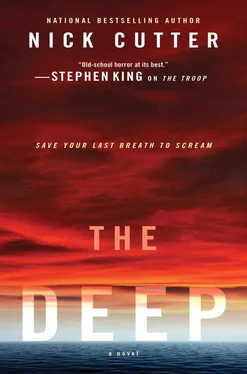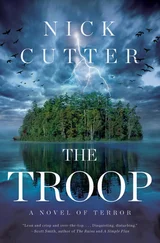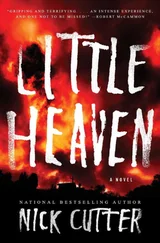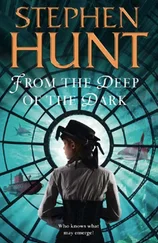“If we’re lucky, we’ll have enough juice to skeedaddle,” she said. “But I want to pump every volt I can into the Challenger . That’ll take a few hours.”
“You’re gonna be able to do it with your hand like that?”
She nodded. “Just pushing buttons and flicking switches. I’m fine on my own. Plus it’s better if you keep an eye on your brother. I’d rather keep him in plain sight.”
Those footsteps thudded again. Closer now—just outside the storage area? The hackles stiffened down LB’s back.
The footsteps drew nearer, producing a thudding echo on the grates. Luke imagined someone— something? —standing— hunching? —in that dissolving edge of light. The outlines of this person or thing shifted restlessly, solidifying momentarily in Luke’s mind before adopting a new guise.
The footsteps stopped. In the silence came a low, liquid breathing. Unrushed and calm: the breath of a man on a leisurely hike.
“Clay?” Luke called.
The breathing stopped. Next, the source itself was gone. The presence vanished, evaporating like steam off a hot bath.
“It’s just the station,” Al said. “Groans and moans.”
“The station, sure,” Luke said, accepting her reasoning, as it made more sense than the alternative. “How you feeling, Al?”
Al held the flashlight under her chin like a boy telling a scary story around a campfire. “I’m feeling fine as cherry wine, Doc.” She chuckled. The walls sponged up her laughter. “We’re going to be okay, Luke. Aren’t we?”
“I think so. We just have to get a little lucky. And hope someone up there is watching over us.”
“Go on. Find your brother. Take the dog, too. And Luke— stay awake .”
THE MAIN LABwas deserted. The lights burned at quarter power.
Luke flicked the switch to activate the exterior spotlights. They didn’t turn on. He flicked them again. Still dark. The viewing window reflected his haunted eyes.
He felt it out there. That sucking, hungering nothingness.
He found a flashlight in a drawer. He turned it on and trained it on the sea floor. The beam illuminated that mounded whiteness, marine snow piled in layers.
There are places on earth where light is unwelcome, Luke thought. Light has no power down here. Darkness is king. Light flees the dark, or it gets devoured.
He watched darkness eat into the glow of his flashlight, dissolving its weak radiance like acid. The beam winnowed and broke apart until—
Something snaked into the dregs of that light, lashing fretfully. Thick and reddish, an enormous night crawler flicking against the window. LB yipped in fright. Luke backed away… then was hit with another image, so much larger and so terrible that his soul withered at its prospect. And yet he didn’t see anything—it would’ve been impossible in that blackness. He only intuited it. Luke caught a sense of something out there. Its presence was enormous, mind-filling. In that moment, he saw how things would look if the seas were drained: the station surrounded by monolithic alabaster cliffs that went up and up until their faces welded with the blackness above. The trench unfurled flat and featureless to the base of those cliffs—and in his mind’s eye, he could see this… this… thing on those towering sheets of stone. It clung to the cliffs with many limbs, spanning all around the trench the way a spider fans its limbs across a web. It had no head to speak of. It was all limbs—all tubes —and each limb was the thickness of an oil tanker. Those limbs convulsed as it detached from the cliff, lowering its terrible body onto the ocean floor. Its limbs smashed down into the ghostly muck, sending up combers of marine snow that rolled in awesome white waves… .
“Lucas.”
Luke spun. The flashlight pinned Clayton in its beam. Luke inhaled sharply. Even LB let out a low yowl of concern.
“You look pained,” Clayton said.
Clay’s body appeared to have shrunk—it was as if the incredible pressure of the water was gradually crushing him down. His chest seemed thicker, his legs, too: Luke had the awful image of an accordion being squeezed with inexorable force.
Clay’s face bore the same hints of compression. Where before it had seemed aristocratic, with the high forehead and flinty cheeks, it now had a fleshy, porcine look. His eyes were squeezed between wadded-up skin, making it seem that he was peering through slits of fatback.
“Are you all right, Clay? You don’t look well.”
“Never better, brother.”
His lab was open. Light spilled across the floor. That familiar dripping noise invaded Luke’s ears.
Drrrrrthilllippppp!
“Come inside,” Clayton said. “You’ll catch your death of cold.”
Another one of their mother’s pet phrases. Luke’s memory raced through a few others. Useless as tits on a bull. Snowball’s chance in hell. Lord love a duck —the phrase she’d screamed after Chester Higgs had beaten her with that hoe.
“It’s not that cold.”
Clayton nodded dismissively and turned back to the lab.
“Clay, wait.”
Clayton wore a sweater, the kind fishermen wear. His left hand was swaddled in gauze. His left arm seemed thicker than his right. Luke figured the whole limb was encased in bandages. God knew what lay underneath.
“Dr. Toy’s dead,” Luke said simply. “The ceiling caved in. Crushed him.”
“That’s too bad,” said Clayton.
“Christ, Clay. Did you hear what I just…? No, of course you did. Westlake, now Toy. The ambrosia is… it’s not what you think it is.”
Clayton scoffed. “It’s simply a substance, Lucas. A tool.”
So goddamn sure of himself. He never learns.
“Do you have any idea what was happening just behind that door?” Luke pointed at Westlake’s lab. “What still is , for all we know? Two men have been killed by… I don’t know what. It’s all linked. The station, the ambrosia, and…”
… whatever controls the ambrosia …
Clayton said, “Do you have any idea how stupid you sound? Westlake went crazy. By the sounds of it, Toy died in a structural collapse. Both of which were known threats. Men have perished underwater in such circumstances before, and will again. It’s the danger of working this deep.”
Luke wanted to grab Clay’s arm (his unbandaged one; the prospect of gripping the other arm was wildly revolting) and drag him to Dr. Toy’s destroyed quarters. He wanted to show Clayton the metal pulsing in the ruined porthole.
But he knew it would be useless. Westlake and Toy were fools. That’s what Clayton would say. And to an extent he was correct, if the only measuring stick for their intellect was his own immeasurable gifts. But they had been smart men, serious men, and they had shattered, utterly. This place had done it to them.
“What if you’re wrong?” Luke said. “Just this once? What if this stuff is of no benefit at all? It can’t cure the ’Gets, can’t cure anything. What if you can’t control it? What… what if it’s controlling you , Clay? If it knows you—your habits, your flaws? Maybe it’s playing you. What if…”
Westlake’s voice: We’re in the basement with the beast —
“…Clay, what if it never lets you go?”
Clayton’s reply was shocking.
“I don’t really care if it cures anything.”
“…wait, what?”
“I… don’t… care ,” he said, enunciating each word. “People need to die. Of cancer and AIDS and whatever else. There’s too many of us. Too many by half. It’s a planetary imperative. Not enough resources to sustain the hordes. We needed a grand curative. We call the ’Gets a disease but it’s not. Mother Nature has taken out her broom; she’s sweeping up the trash.”
Читать дальше












